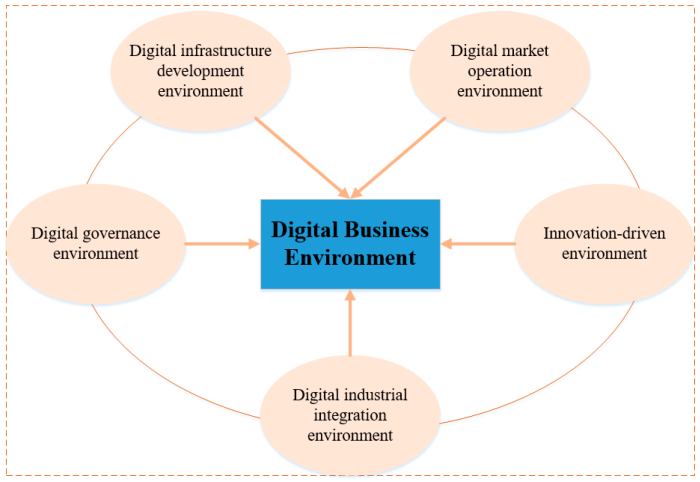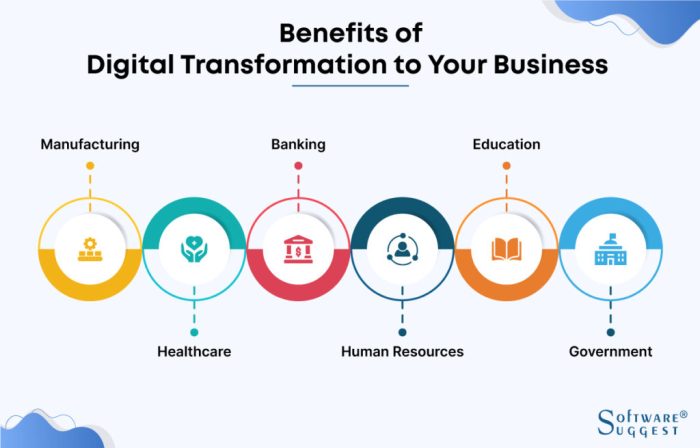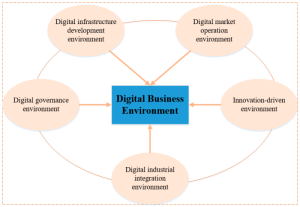
Step into the world of digital transformation in the business environment where innovation meets industry, challenges are embraced, and success stories unfold. Get ready for a journey that will change the way you view business strategies forever.
Digital Transformation in Business Environment
Digital transformation in a business environment refers to the integration of digital technologies into all areas of a business, fundamentally changing how it operates and delivers value to customers. This involves leveraging digital tools and technologies to streamline processes, improve efficiency, and enhance the overall customer experience.
Impact on Different Industries
- Healthcare: Digital transformation can improve patient care through telemedicine, electronic health records, and remote monitoring devices.
- Retail: Implementing digital transformation strategies can enhance the online shopping experience, personalize marketing efforts, and optimize inventory management.
- Manufacturing: Automation, IoT devices, and data analytics can help manufacturers improve production efficiency, reduce costs, and enhance product quality.
Benefits of Implementing Digital Transformation
- Increased efficiency: Automation and digital tools can streamline processes and reduce manual tasks.
- Enhanced customer experience: Personalized interactions, improved service delivery, and omnichannel experiences can boost customer satisfaction.
- Competitive advantage: Companies that embrace digital transformation are better positioned to adapt to market changes and stay ahead of competitors.
Challenges Companies May Face
- Resistance to change: Employees may be reluctant to adopt new digital tools and processes, leading to implementation challenges.
- Data security concerns: With increased digitalization comes the risk of data breaches and cyber threats that companies need to address proactively.
- Cost implications: Investing in digital transformation can be costly, and companies need to carefully balance the benefits with the expenses involved.
Chemicals and Allied Products
Digital transformation plays a crucial role in the chemicals and allied products industry by revolutionizing traditional processes and enhancing overall efficiency. Companies in this sector are increasingly adopting digital technologies to stay competitive and meet the evolving demands of the market.
Areas of Improvement
- Supply Chain Management: Digital transformation can optimize supply chain processes, improve visibility, and enhance communication with suppliers and distributors.
- R&D and Innovation: Advanced analytics and AI can accelerate product development and innovation, leading to the creation of new products and improved formulations.
- Quality Control: IoT sensors and data analytics can ensure consistent quality standards and reduce defects in manufacturing processes.
Streamlining Production Processes
Digital technologies such as IoT, AI, and big data analytics can streamline production processes in the chemicals and allied products industry by enabling predictive maintenance, real-time monitoring of equipment, and automated data collection. This not only increases operational efficiency but also reduces downtime and maintenance costs.
Successful Integration Examples
- BASF: The chemical giant has implemented a digital transformation strategy that focuses on data-driven decision-making, IoT-enabled production processes, and predictive maintenance to optimize operations and enhance productivity.
- Dow Chemical Company: Dow has leveraged digital technologies such as AI and machine learning to improve process efficiency, reduce waste, and drive innovation in product development.
Construction and Maintenance

The construction and maintenance sector plays a crucial role in shaping infrastructure and ensuring the longevity of built environments. Digital transformation in this industry is essential for optimizing processes, enhancing efficiency, and improving overall project outcomes.
Innovative Technologies in Construction and Maintenance
- Building Information Modeling (BIM): BIM allows for the creation of digital representations of physical and functional characteristics of a building. This technology enhances collaboration, improves decision-making, and reduces errors during the construction process.
- Internet of Things (IoT): IoT devices enable real-time monitoring of equipment, structures, and environments. This data can be used to predict maintenance needs, optimize energy consumption, and enhance safety on construction sites.
- Drones: Drones are used for surveying, mapping, and monitoring construction sites. They provide a bird’s eye view of the project, improving safety, efficiency, and accuracy in data collection.
- Augmented Reality (AR) and Virtual Reality (VR): AR and VR technologies are utilized for design visualization, project planning, and training purposes. They enhance communication among project stakeholders and improve decision-making processes.
Impact of Digital Tools in Construction and Maintenance
- Project Management: Digital tools streamline project management processes, enabling better coordination, communication, and scheduling. This leads to increased productivity and reduced delays in project delivery.
- Cost Efficiency: Digital transformation helps in optimizing resource allocation, reducing wastage, and improving overall cost efficiency. Real-time data and analytics enable better budget management and cost controls.
- Sustainability: Digital tools facilitate the implementation of sustainable practices in construction and maintenance. From eco-friendly materials selection to energy-efficient design solutions, technology plays a key role in promoting sustainability in the industry.
Challenges in Adopting Digital Transformation
- Resistance to Change: Employees and stakeholders may resist adopting new technologies due to fear of job displacement, lack of training, or unfamiliarity with digital tools.
- Data Security Concerns: With the increasing reliance on digital platforms, data security becomes a significant challenge. Construction and maintenance companies need to invest in robust cybersecurity measures to protect sensitive information.
- Integration Issues: Integrating new digital tools with existing systems and workflows can be complex and time-consuming. Companies may face compatibility issues and disruptions during the transition phase.
Consumer Goods and Services

The consumer goods and services sector is experiencing a significant transformation due to digital advancements. Companies in this industry are leveraging technology to enhance customer experiences and stay competitive in the market.
Digital Transformation in Consumer Goods and Services
- E-commerce platforms have revolutionized the way consumers shop, providing convenience and accessibility like never before. Companies are investing in robust online stores to reach a wider audience and offer seamless shopping experiences.
- Data analytics plays a crucial role in understanding consumer behavior and preferences. By analyzing data, businesses can tailor their products and marketing strategies to meet the evolving needs of their customers.
- Personalized marketing has become a key strategy for consumer goods and services companies. By delivering targeted messages and offers to individual customers based on their preferences and past interactions, companies can drive engagement and loyalty.
Success Stories in Digital Transformation
- Amazon is a prime example of a company that has successfully leveraged digital transformation in the consumer goods sector. With its user-friendly interface, personalized recommendations, and efficient delivery services, Amazon has become a powerhouse in online retail.
- Nike has embraced digital innovation by launching interactive apps, customizable products, and engaging social media campaigns. By connecting with customers on digital platforms, Nike has strengthened its brand presence and customer relationships.
Business Energy
Digital transformation is revolutionizing the business energy sector, bringing about significant changes in energy management practices. Smart technologies and data analytics play a crucial role in reshaping how businesses optimize energy consumption and reduce costs through innovative digital solutions.
Impact of Digital Transformation on Business Energy Sector
- Improved Energy Efficiency: Digital tools enable businesses to monitor and analyze energy usage in real-time, leading to more efficient operations.
- Cost Reduction: By identifying areas of waste and implementing smart solutions, companies can lower their energy expenses and increase profitability.
- Enhanced Sustainability: Adopting digital technologies allows businesses to track their carbon footprint and implement sustainable energy practices.
Companies Leading the Way in Sustainable Energy Practices
- Google: Utilizes AI algorithms to optimize data center cooling systems, reducing energy consumption.
- Tesla: Pioneers in renewable energy solutions, offering solar panels and energy storage products for businesses.
- General Electric: Implements IoT devices for predictive maintenance, improving energy efficiency in industrial settings.
Business Environment
In today’s rapidly evolving business landscape, digital transformation plays a crucial role in shaping the overall environment. Companies across industries are leveraging digital tools to enhance their operations, collaboration, and competitiveness in the market.
Influence of Digital Transformation
- Digital transformation has revolutionized the way businesses operate by enabling streamlined processes, increased efficiency, and improved decision-making.
- Companies are now able to reach a wider audience, target their customers more effectively, and adapt to changing market trends with the help of digital technologies.
- The integration of digital tools has also led to the creation of new business models, offering innovative solutions and services to meet the evolving needs of consumers.
Role of Automation, Artificial Intelligence, and Cloud Computing
- Automation has significantly reduced manual tasks, allowing employees to focus on more strategic initiatives and driving productivity within organizations.
- Artificial intelligence is transforming data analysis, customer interactions, and decision-making processes, leading to more personalized experiences for customers and efficient operations.
- Cloud computing has provided businesses with scalable and flexible infrastructure, enabling cost-effective solutions, improved collaboration, and enhanced data security.
Adapting to Evolving Digital Trends
- Businesses need to continuously adapt to evolving digital trends to stay relevant and resilient in today’s competitive environment.
- Embracing digital transformation requires a cultural shift within organizations, fostering a mindset of innovation, agility, and continuous learning.
- Companies that successfully navigate digital disruptions are better positioned to seize opportunities, drive growth, and maintain a competitive edge in the market.
Ending Remarks
As we wrap up our exploration of digital transformation in the business environment, remember that adaptability is key, innovation is crucial, and staying ahead of the curve is essential. Embrace the digital wave and watch your business thrive in the ever-evolving landscape of technology.
Question Bank
How can digital transformation benefit different industries?
Digital transformation can lead to increased efficiency, streamlined processes, better customer experiences, and overall growth for various industries.
What are some common challenges faced by companies during digital transformation?
Common challenges include resistance to change, integration issues, cybersecurity concerns, and the need for upskilling employees.
How does digital transformation impact project management in the construction sector?
Digital tools can enhance project tracking, scheduling, collaboration, and cost control in construction projects, leading to improved efficiency and timely completion.
What role does data analytics play in revolutionizing consumer goods and services businesses?
Data analytics helps businesses understand consumer behavior, personalize marketing strategies, optimize product offerings, and enhance customer satisfaction in the competitive market.
Why is it important for businesses in the energy sector to adopt digital transformation?
Adopting digital solutions can help businesses in the energy sector optimize energy consumption, reduce costs, improve sustainability practices, and stay ahead in the evolving market.





